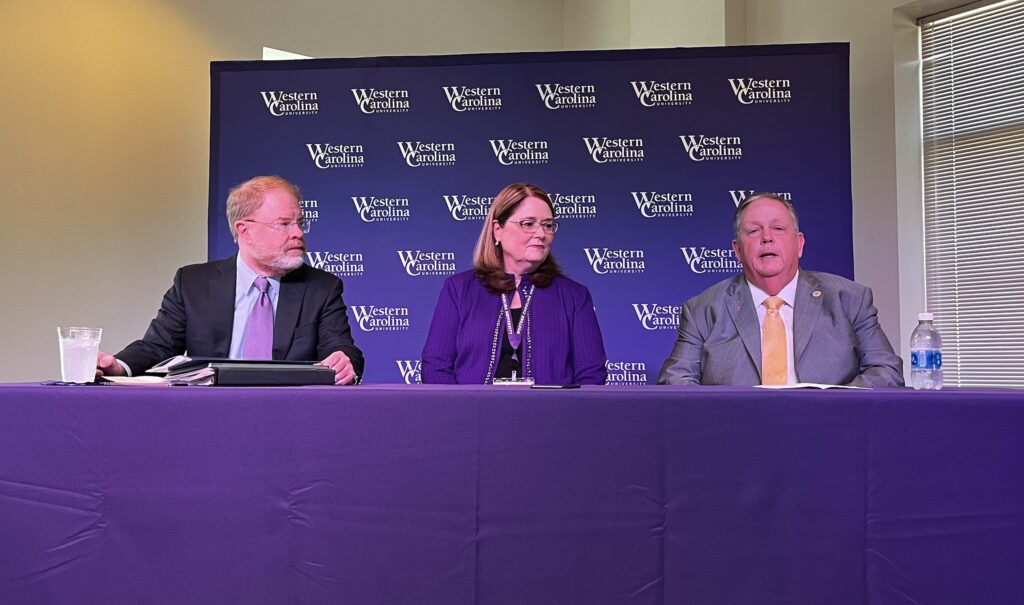
The UNC Board of Governors meeting at Western Carolina University concluded with a short press conference highlighting some of the decisions and discussions.
In that fifteen-minute time span, student protests and free speech was elaborated on, the Board confirmed they will not be raising tuition prices due to inflation and funding negotiations will continue on the legislative level, and the board passed a motion that extended the time in which SAT and ACT scores will not be required for applying to any UNC school.
Seated at the table was UNC System President Peter Hans, Chancellor Kelli Brown and Board of Governors Chair Randall Ramsey.
The board was first asked to comment their current thinking on student freedom of expression on Western’s campus and fostering a campus that encourages diversity of opinion, which was highlighted by the university’s recent coverage on Fox News.
Hans was encouraged by the fact that students are engaging comfortably in current events and issues. “That is the hallmark of open and free debate that we want to see on all of our university campuses,” said Hans.
Chancellor Brown added that on WCU’s campus, “we try to do our best every single day to make sure that every student’s voice is heard on this campus.”
The previous day, during a governance meeting, the governors, NC senators and other guests discussed stopping student protests if they were disruptive to campus. When asked to define what the board meant by “disruptive”, Hans turned to his lawyer for assistance.
(See the full story from the BOG Governance meeting.)
General Council for the UNC system, Andrew Tripp, said that since the law does not define what “disruptive” is, they are using the dictionary definition.
As he explained in this context, activities “under the guise of speech” that prevent work from being done or endanger the campus community would be considered disruptive.
Chief of Staff, Norma Houston also talked about a case law surrounding freedom of expression and the protecting of First Amendment rights. She mentions that reasonable time, place and manor restrictions can be placed on these rights, including when disruptions endanger campus health, safety, and welfare.
Houston and Tripp agree that these “disruptions” would be analyzed on a case-by-case basis.
Hans was asked to comment on how to keep college affordable in a time of inflation and making college accessible to everyone.
Hans said the UNC system compares favorably against the rest of the country.
“In terms of affordability, we are near the very lowest cost…That affordability is key to access and extending the benefits to the university to as many North Carolinians as possible,” said Hans.
He explained it is not only a constitutional commitment, but a moral obligation as well.
“I think Western Carolina is a shining example of being able to actually balance affordability, access, and high quality,” said Hans. Western Carolina is this affordable due to the NC Promise, keeping the tuition rates for in-state students at $500 per semester.
They were then asked what they plan to do to combat the decreased enrollment of male students in the system. Hans believed it is part of a larger cultural phenomenon.
He thinks that male students are beginning to believe that higher education is not right for them during junior high or early high school. He said the more they can help public schools, the more male students will come to college, and that the education programs within the UNC system will help with that.
Brown agreed that mentors, guidance counselors, or other members of the community can help encourage male students to go to college.
In an earlier meeting, an extension passed that allowed ACT and SAT tests scores to not be required as part of the application process to UNC system schools until 2024. The board was asked their perspective on these tests moving forward.
Ramsey commented that the board is passionate about not hindering anyone’s opportunity from entering a UNC university.
“Our board debated this pretty recently, a couple meetings ago… whether we will bring those requirements back in at all.”
Lastly, the board was asked to comment on how they planned to support faculty and staff during the inflation.
Hans mentioned how this is a topic that they are trying to bring to the attention of legislators. They were successful in getting a 5% increase in salary for faculty and staff in November of 2021. But as costs and inflation both increase, Hans said they will continue their conversation with the legislature in May.
While Ramsey agreed that educators are important, he mentioned how inflation is impacting everyone and how the only way to fix the salary issue is through taxpayer dollars or raising tuition, neither of which they want to do.
See the full story from the Finance and budget committee meeting.



